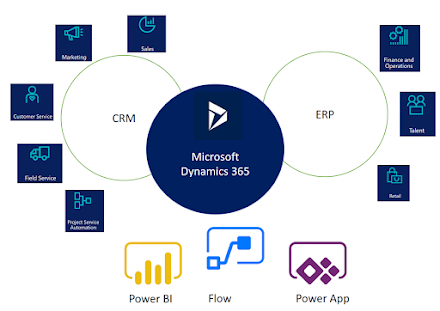What is microsoft dynamics and its uses
Microsoft Dynamics is a suite of enterprise resource
planning (ERP) and customer relationship management (CRM) software applications
developed by Microsoft. It provides businesses with a range of tools and
functionalities to manage various aspects of their operations, including
finance, sales, customer service, supply chain, and human resources. In this
comprehensive explanation, we will explore Microsoft Dynamics and its diverse
applications in detail.
Introduction to Microsoft Dynamics
Microsoft Dynamics is a collection of business applications designed to help organizations streamline and automate their key processes, improve efficiency, and enhance customer engagement. It encompasses several individual software applications, each catering to specific functional areas of an organization.
The main products within the Microsoft Dynamics suite include:
Key Features of Microsoft Dynamics
1. Integration and Data Accessibility: Microsoft Dynamics
offers seamless integration with other Microsoft products and services, such as
Office 365 and Power Platform. This integration enables users to access and
share data across different applications, enhancing collaboration and improving
data consistency.
2. Customization and Flexibility: Microsoft Dynamics provides extensive customization options, allowing businesses to tailor the software to their specific needs and processes. Users can create custom entities, fields, workflows, and reports to reflect their unique business requirements.
3. Business Intelligence and Analytics: Microsoft Dynamics incorporates powerful analytics and reporting capabilities that enable users to gain insights into their business data. Advanced analytics tools, such as Power BI, allow users to create interactive dashboards and reports, perform data analysis, and make informed decisions.
4. Automation and Workflow Management: Microsoft Dynamics enables businesses to automate repetitive tasks and streamline workflows. Users can define business rules, workflows, and approvals to automate processes, reduce manual effort, and improve operational efficiency.
5. Customer Relationship Management (CRM) Functionality: Microsoft Dynamics CRM applications provide robust customer management capabilities. They allow businesses to track customer interactions, manage leads, opportunities, and pipelines, and enhance customer engagement through personalized marketing campaigns and customer service processes.
6. ERP Functionality: Microsoft Dynamics ERP applications help organizations streamline their financial and operational processes. They support functions such as financial management, supply chain management, manufacturing, project management, and human resources, providing a comprehensive solution for end-to-end business management.
Benefits of Microsoft Dynamics
1. Enhanced Business Efficiency: By automating processes,
integrating data, and providing real-time insights, Microsoft Dynamics helps
businesses improve their operational efficiency. It reduces manual effort, minimizes
errors, and enables employees to focus on high-value tasks, leading to
increased productivity and cost savings.
2. Streamlined Collaboration: Microsoft Dynamics promotes collaboration and communication across departments and teams. Users can share data, documents, and insights, facilitating better decision-making and fostering a collaborative work environment.
3. Improved Customer Engagement: With its CRM functionalities, Microsoft Dynamics enables businesses to provide personalized and consistent customer experiences. It helps manage customer interactions, track customer preferences, nurturing leads, and deliver timely and relevant communications. This leads to improved customer satisfaction, loyalty, and retention.
4. Data-Driven Decision Making: Microsoft Dynamics provides powerful analytics and reporting capabilities that enable businesses to gain insights from their data. Users can generate customizable reports, create interactive dashboards, and perform advanced data analysis. By leveraging these insights, organizations can make informed decisions, identify trends, and identify areas for improvement.
5. Scalability and Flexibility: Microsoft Dynamics is designed to scale with the growth of businesses. Whether an organization is small or large, Microsoft Dynamics can adapt to changing needs and accommodate increasing data volumes. It provides flexibility in terms of customization, allowing businesses to tailor the software to their specific requirements and processes.
6. Regulatory Compliance: Microsoft Dynamics incorporates features and functionalities that help organizations comply with industry regulations and standards. It provides tools for data security, access controls, audit trails, and compliance reporting. This ensures that businesses can meet regulatory requirements and maintain data integrity and confidentiality.
7. Enhanced Sales and Revenue Generation: With its sales management capabilities, Microsoft Dynamics helps businesses streamline their sales processes, track leads, and manage opportunities. This leads to improved sales efficiency, faster deal closures, and increased revenue generation.
8. Customer Retention and Loyalty: By centralizing customer data and enabling personalized interactions, Microsoft Dynamics CRM functionalities assist in building strong customer relationships. It allows businesses to track customer preferences, history, and interactions, enabling targeted marketing campaigns and proactive customer support. This fosters customer loyalty, enhances retention rates, and drives repeat business.
9. Improved Operational Visibility: Microsoft Dynamics provides real-time visibility into various aspects of business operations. Users can access up-to-date information on sales, inventory, financials, and other key metrics. This visibility enables organizations to monitor performance, identify bottlenecks, and make data-driven decisions to optimize operations.
10. Competitive Advantage: Implementing Microsoft Dynamics can provide a competitive advantage to businesses. It empowers organizations to operate more efficiently, deliver exceptional customer experiences, and stay ahead of competitors. By leveraging the capabilities of Microsoft Dynamics, businesses can differentiate themselves in the market and drive growth.
Diverse Applications of Microsoft Dynamics
1. Sales and Marketing: Microsoft Dynamics CRM applications
provide comprehensive sales and marketing capabilities. Sales teams can track
leads, manage opportunities, and collaborate on deals, while marketing teams
can create targeted campaigns, track campaign effectiveness, and nurture leads.
The integration of CRM with other Microsoft tools like Outlook and SharePoint
ensures seamless communication and collaboration between sales and marketing
teams.
2. Customer Service and Support: Microsoft Dynamics CRM offers robust customer service functionalities, allowing organizations to deliver exceptional customer support. It provides case management, knowledge base, and service-level agreement (SLA) tracking features to ensure timely resolution of customer issues. Integration with other channels like email, chat, and social media allows businesses to provide a consistent and omnichannel customer service experience.
3. Financial Management: Microsoft Dynamics ERP applications, such as Dynamics 365 Finance, help businesses streamline their financial operations. They provide features for general ledger, accounts payable and receivable, budgeting, cash flow management, and financial reporting. These functionalities enable organizations to maintain accurate financial records, optimize cash flow, and comply with regulatory requirements.
4. Supply Chain Management: Microsoft Dynamics ERP applications, including Dynamics 365 Supply Chain Management, assist organizations in managing their supply chain processes effectively. They cover areas such as inventory management, procurement, production planning, warehouse management, and demand forecasting. By optimizing supply chain operations, businesses can reduce costs, improve inventory management, and enhance overall efficiency.
5. Manufacturing: Microsoft Dynamics offers solutions for manufacturing companies to streamline their production processes. It enables manufacturers to plan and schedule production, manage bills of materials (BOM), track work orders, and optimize resource allocation. With real-time visibility into production operations, organizations can improve production efficiency, reduce lead times, and ensure product quality.
6. Project Management: Microsoft Dynamics provides project management capabilities through applications like Dynamics 365 Project Operations. It helps businesses plan and execute projects, track project progress, allocate resources, and manage project budgets. By providing project visibility and control, organizations can improve project delivery, optimize resource utilization, and enhance project profitability.
Integration and Ecosystem
Microsoft Dynamics integrates seamlessly with other
Microsoft products and services, creating a cohesive and unified ecosystem.
Integration with tools like Office 365, Power Platform, SharePoint, and Teams
enables businesses to leverage the full power of Microsoft's productivity
suite. This integration allows for efficient data sharing, collaboration, and
workflow automation across different applications.
Furthermore, Microsoft Dynamics integrates with third-party applications and services through connectors and APIs, enabling businesses to extend its functionalities and integrate with specialized solutions that cater to specific industry requirements.
Conclusion
Microsoft Dynamics is a versatile suite of ERP and CRM applications that offers businesses a comprehensive set of tools to manage their operations, enhance customer engagement, and drive growth. With its robust features, flexibility, and seamless integration with other Microsoft products, it provides organizations with a unified platform to streamline processes, improve efficiency, and deliver exceptional customer experiences. Whether it's managing sales, marketing, customer service, finance, supply chain, or project operations, Microsoft Dynamics offers a scalable and customizable solution to meet the diverse needs of businesses across various industries.



Comments
Post a Comment